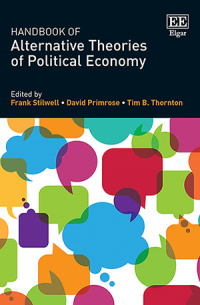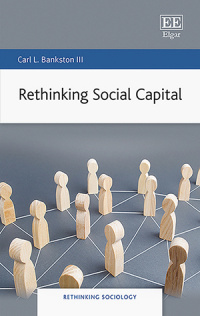Hardback
Inequalities and the Progressive Era
Breakthroughs and Legacies
9781788972642 Edward Elgar Publishing
Inequalities and the Progressive Era features contributors from all corners of the world, each exploring a different type of inequality during the ‘Progressive Era’ (1890s-1930s). Though this era is most associated with the United States, it corresponds to a historical period in which profound changes and progress are realized or expected all over the globe.
More Information
Critical Acclaim
Contributors
Contents
More Information
不平等和进步时代的特征是来自世界各地的贡献者,每个人都探索了进步时代(1890年代至1930年代)的不同类型的不平等。尽管这个时代与美国最相关,但它与一个历史时期相对应,在全球范围内实现或预期的深刻变化和进步。
The original and international perspectives of the book make it possible to examine important issues or authors of the Progressive Era, who have at times been neglected or insufficiently discussed. This analysis allows us both to know more about this key period of the history of capitalism, and to consider contemporary debates regarding the treatment of inequalities with a pluralistic approach.
从博士学位和硕士学位学生到本科生的各个级别的学术界和学生将欣赏最初对不平等的根源和治疗的重点,以及社会科学领域研究人员之间的这种创新合作。
The original and international perspectives of the book make it possible to examine important issues or authors of the Progressive Era, who have at times been neglected or insufficiently discussed. This analysis allows us both to know more about this key period of the history of capitalism, and to consider contemporary debates regarding the treatment of inequalities with a pluralistic approach.
从博士学位和硕士学位学生到本科生的各个级别的学术界和学生将欣赏最初对不平等的根源和治疗的重点,以及社会科学领域研究人员之间的这种创新合作。
Critical Acclaim
‘The collection itself is fascinating in the scope of the material. Many of those identified here as Progressives are absent from the orthodox treatments of the subject, which has been for the most part confined to a specific period in the economic and social history of the United States.’
– Charles R McCann Jr, History of Economic Ideas
‘Rising inequality in late 19th and early 20th centuries US led to the development between 1920 and 1980 of the most successful and ambitious progressive tax system ever experimented. If you want to know more about the intellectual roots of the progressive era, you should read this great collection of essays. A fascinating book.’
– Thomas Piketty, Ecole des Hautes Etudes en Sciences Sociales and Paris School of Economics, France
‘This remarkable and carefully curated volume is an invaluable roadmap to the treatment of inequalities during the fascinating and often misunderstood Progressive Era. As Guillaume Vallet and his contributors argue there is much to be learned about this transformative era of political, economic, and social reform. Today, we confront a wide range of unacceptable inequalities. Academics, policymakers, and activists should look to this volume for inspiration as they design and advocate pathways out of the present morass.’
- 美国丹佛大学的Ilene Grabel
Although “The Progressive Era” is usually understood as the period from 1900 to 1917 in the United States during which major political, social, and economic reforms took place, the authors of the twenty-two essays about more than a dozen countries on five continents in this volume broaden the geographical and chronological (1890s-1930s) focus on similar reform activities. Current efforts to address the problem of increasing inequalities of wealth and income in our own time can benefit from the perspectives provided by these studies of a similar problem a century ago.’
– James M. McPherson, Princeton University, US and author of Battle Cry of Freedom; The Civil War Era
– Charles R McCann Jr, History of Economic Ideas
‘Rising inequality in late 19th and early 20th centuries US led to the development between 1920 and 1980 of the most successful and ambitious progressive tax system ever experimented. If you want to know more about the intellectual roots of the progressive era, you should read this great collection of essays. A fascinating book.’
– Thomas Piketty, Ecole des Hautes Etudes en Sciences Sociales and Paris School of Economics, France
‘This remarkable and carefully curated volume is an invaluable roadmap to the treatment of inequalities during the fascinating and often misunderstood Progressive Era. As Guillaume Vallet and his contributors argue there is much to be learned about this transformative era of political, economic, and social reform. Today, we confront a wide range of unacceptable inequalities. Academics, policymakers, and activists should look to this volume for inspiration as they design and advocate pathways out of the present morass.’
- 美国丹佛大学的Ilene Grabel
Although “The Progressive Era” is usually understood as the period from 1900 to 1917 in the United States during which major political, social, and economic reforms took place, the authors of the twenty-two essays about more than a dozen countries on five continents in this volume broaden the geographical and chronological (1890s-1930s) focus on similar reform activities. Current efforts to address the problem of increasing inequalities of wealth and income in our own time can benefit from the perspectives provided by these studies of a similar problem a century ago.’
– James M. McPherson, Princeton University, US and author of Battle Cry of Freedom; The Civil War Era
Contributors
Contributors: V. Babashkin, T. Briggs, B. Buarque de Hollanda, C. Castelain-Meunier, V. Chassagnon, R.W. Dimand, B. Dubrion, O. Goerg, F. Granda, O. Lakomski-Laguerre, C. Maumi, S. Meardon, A. Millmow, C. Morrisson, T. N’Diaye, A. Nikulin, J.N. Parker, S. Pressman, M. Rocca, C. Schrecker, F. Sember, R. Skidelsky, H. Tanaka, P. Thane, G. Vallet
Contents
Contents:
Preface
Stephany Griffith-Jones
Introduction
Guillaume Vallet
I. Foundations of inequalities
1. The question of inequalities during the Progressive Era in the United States: The “Golden Mean” program of the economist Richard T. Ely
Michel Rocca
2. The progressive view of old institutionalism: Business ethics, industrial democracy and reasonable capitalism
Virgile Chassagnon and Benjamin Dubrion
3. Inequalities and the dynamics of capitalism: Will democracy survive? Albion W. Small’s view
Guillaume Vallet
4. Forgetting and remembering the Chicago school of Colombus, Ohio: Roderick D. McKenzie, neighborhoods, and inequality
杰弗里·纳撒尼尔·帕克
5. Progressive values and institutional realities at the New School for Social Research
Cherry Schrecker
6. Progressive economic thought in interwar Australia
Alex Millmow
7. Repeated disappearance: Why was progressivism forgotten in Japanese economics?
Hidetomi Tanaka
II. Fighting income, capital and land inequalities
8. Income inequality: A turning point, 1880–1930
克里斯蒂安·莫里森(Christian Morrisson)
9. Inequalities in the United Kingdom: The “Progressive” Era, 1890s–1920s
Patricia Thane
10. Distribution as a macroeconomic problem
Robert Skidelsky
11. Land ownership as a mechanism for the reproduction of inequality in Ecuador from 1895 to 1920s
Francisca Granda
12. Peasants, inequality and progress in the research of Alexander Chayanov: Russia and the world
Vladimir Babashkin and Alexander Nikulin
13. Broadacre City: Frank Llyod Wright’s vision of an organic capitalism
Catherine Maumi
14. The tariff question, the labor question, and Henry George’s triangulation
Stephen Meardon
III. Fighting social inequalities
15. Schumpeter’s view of social inequalities
Odile Lakomski-Laguerre
16. W.E.B. Du Bois on poverty and racial inequality
Steven Pressman and Thomas Briggs
17. A reconsideration of James Africanus Beale Horton of Sierra Leone (1835–1883) and his legacy
Odile Goerg
18. Sol Plaatje: An intellectual giant in the 20th century history of black South Africa
Tidiane N’Diaye and Guillaume Vallet
19. Stephen Leacock on political economy and the unsolved riddle of social justice
Robert W. Dimand
20. Trailblazing feminists at the turn of the twentieth century: A focus on Marianne Weber and Lou-Andreas Salomé
Christine Castelain-Meunier
21. Silvio Gesell’s vision on monetary reform: how to reduce social inequalities
的卡Sember
22. Football culture and sports history in Latin America: From the Progressive Era to contemporary times
Bernardo Buarque de Hollanda
Index
Preface
Stephany Griffith-Jones
Introduction
Guillaume Vallet
I. Foundations of inequalities
1. The question of inequalities during the Progressive Era in the United States: The “Golden Mean” program of the economist Richard T. Ely
Michel Rocca
2. The progressive view of old institutionalism: Business ethics, industrial democracy and reasonable capitalism
Virgile Chassagnon and Benjamin Dubrion
3. Inequalities and the dynamics of capitalism: Will democracy survive? Albion W. Small’s view
Guillaume Vallet
4. Forgetting and remembering the Chicago school of Colombus, Ohio: Roderick D. McKenzie, neighborhoods, and inequality
杰弗里·纳撒尼尔·帕克
5. Progressive values and institutional realities at the New School for Social Research
Cherry Schrecker
6. Progressive economic thought in interwar Australia
Alex Millmow
7. Repeated disappearance: Why was progressivism forgotten in Japanese economics?
Hidetomi Tanaka
II. Fighting income, capital and land inequalities
8. Income inequality: A turning point, 1880–1930
克里斯蒂安·莫里森(Christian Morrisson)
9. Inequalities in the United Kingdom: The “Progressive” Era, 1890s–1920s
Patricia Thane
10. Distribution as a macroeconomic problem
Robert Skidelsky
11. Land ownership as a mechanism for the reproduction of inequality in Ecuador from 1895 to 1920s
Francisca Granda
12. Peasants, inequality and progress in the research of Alexander Chayanov: Russia and the world
Vladimir Babashkin and Alexander Nikulin
13. Broadacre City: Frank Llyod Wright’s vision of an organic capitalism
Catherine Maumi
14. The tariff question, the labor question, and Henry George’s triangulation
Stephen Meardon
III. Fighting social inequalities
15. Schumpeter’s view of social inequalities
Odile Lakomski-Laguerre
16. W.E.B. Du Bois on poverty and racial inequality
Steven Pressman and Thomas Briggs
17. A reconsideration of James Africanus Beale Horton of Sierra Leone (1835–1883) and his legacy
Odile Goerg
18. Sol Plaatje: An intellectual giant in the 20th century history of black South Africa
Tidiane N’Diaye and Guillaume Vallet
19. Stephen Leacock on political economy and the unsolved riddle of social justice
Robert W. Dimand
20. Trailblazing feminists at the turn of the twentieth century: A focus on Marianne Weber and Lou-Andreas Salomé
Christine Castelain-Meunier
21. Silvio Gesell’s vision on monetary reform: how to reduce social inequalities
的卡Sember
22. Football culture and sports history in Latin America: From the Progressive Era to contemporary times
Bernardo Buarque de Hollanda
Index





